“Education is not the filling of a pail, but the lighting of a fire.”
So reads a quote often attributed – quite possibly falsely – to W. B. Yeats. For Alain Fuchs, president of PSL Research University in Paris, the phrase is an apt reminder that although technology will certainly change universities, “lighting the fire” of learning is a “matter of human contacts” – meaning that the physical university, with its face-to-face teaching, still has a healthy future despite the wave of digital disruption.
Fuchs’ view is typical of the close to 200 institution leaders – all of them from the world’s top 1,000 universities – who took part in a Times Higher Education survey on the university in 2030. The questions concern a wide range of topics, the majority of which were covered in last week’s THE. In this feature, we focus on the role of technology in shaping universities’ future in the short to medium term.
On the whole, our respondents – who hail from 45 countries across six continents – are sceptical that digital learning will supplant face-to-face learning any time soon. Although 63 per cent believe that established and prestigious universities will be offering full degrees online by 2030, compared with just 19 per cent who do not, only 24 per cent believe that online degree courses will be more popular than campus-based ones by 2030, against 53 per cent who disagree. And only 19 per cent think that digital technology will have eradicated physical lectures by 2030, compared with 65 per cent who disagree.
This does not mean that leaders wish to preserve the existing university in aspic; several consider the traditional lecture to be outdated. But they do not think that learning can simply move online wholesale. The heart of their argument is that human contact still matters: for fruitful teaching and research collaborations, but also for instilling in students values and behaviours that set them up for adult life.
According to Fuchs, who has also served as president of France’s National Centre for Scientific Research, “deep understanding”, as opposed to “only being able to reply to an examination question”, relies on students being in the physical presence of experts for a long time. To grasp a difficult concept, “you not only need to read things about it, but you need to physically see someone who explains it”, he says.
Lino Guzzella, president of ETH Zurich, agrees. “Meeting people, interacting with peers, students and supervisors – in short, a real university environment – is the key to deep understanding,” he says.
Other university leaders put it more bluntly. One Australian vice-chancellor says that “face-to-face interaction will never be matched in quality by other modes of communication” – even if current “fads temporarily appear to be tilting the balance towards non-human interaction”.
For Jane Gatewood, vice-provost for global engagement at the University of Rochester in New York state, the value of the human element is demonstrated by the fact that when alumni – a crucial source of funding to US universities – return to campus, they do not simply recount tales of the knowledge they accumulated when they were students. Rather, “when they talk about what they learned, they talk about their professors. And when they talk about their experience, they talk about their friends and the structure of programmes. So those things are critical – the form is important,” she argues. The difference between residential and online learning is like the difference between visiting a new place or location and merely “watching a video” of it, she adds.
Indeed, respondents put such store in the value of physical interaction that several feel that in a digitally atomised future, students will value personal engagement in universities even more than they do now. “Human engagement will be more valued as it becomes scarcer,” says one Irish university leader. “The Oxford/Cambridge model of tutorial-based education will be aspired to by those with academic or financial choices of where to study.”
While university leaders may well be right that students will continue to flock to physical campuses over the next decade, evidence that students learn best when in the same room as their lecturers is actually very scant.
Educational researchers Robert Bernard, Eugene Borokhovski and Richard Schmid work at the Centre for the Study of Learning and Performance at Concordia University, Canada. “We know of no empirical evidence that says that classroom instruction benefits students (compared to alternatives) from a learning achievement perspective,” they tell THE.
One of their meta-analyses of the efficacy of classroom-based learning versus courses delivered wholly online found “no difference with regard to student achievement. This strong, evidence-based outcome ran counter to even educators’ widespread assumption that distance education must be inferior.”
In fact, they argue, “the medium matters far less than the quality of the pedagogy”. Universities need to “capture and challenge the imagination, based on the learners’ pre-existing knowledge. That is what works, whether it is in the classroom or online.”
Asked why some university leaders might still think face-to-face instruction is inherently superior, they say there is a “natural tendency” among lecturers “to favour instructional conditions that they are accustomed to [over] alternatives that they have not yet invested in or experienced”.
The virtual campus: digital lectures and online degrees
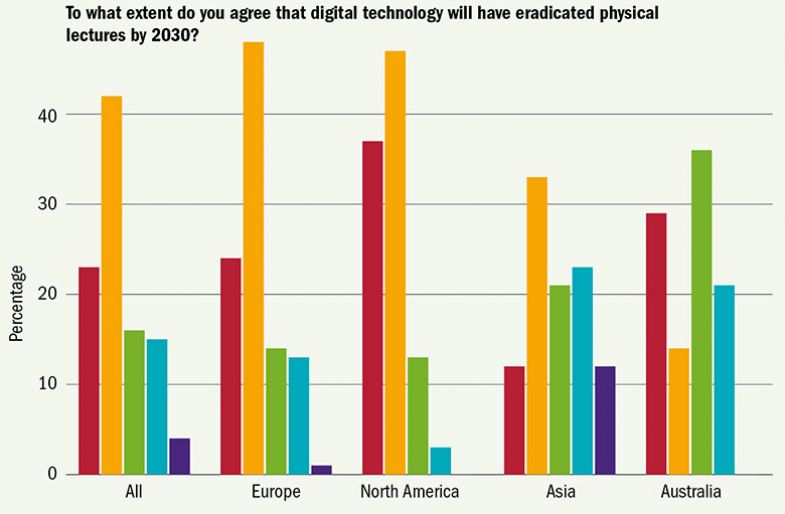
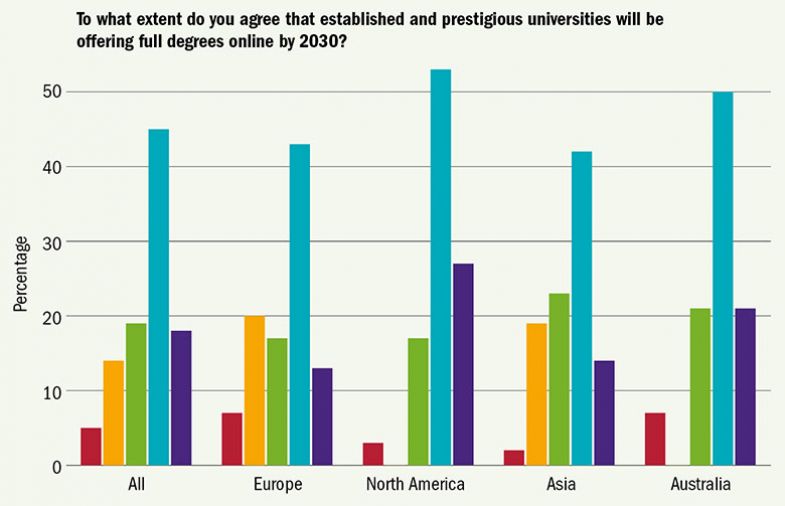
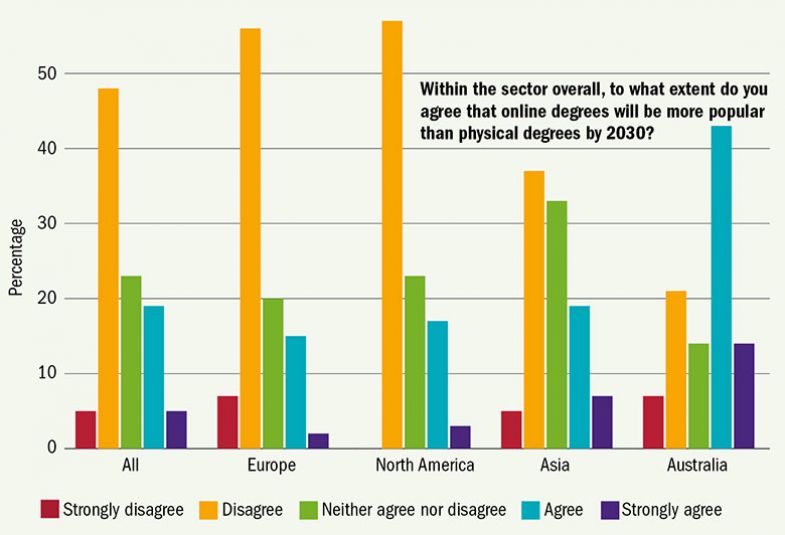
Although the findings of meta-analyses are never completely clear cut, the researchers have also found that blended learning – a mixture of online and real-life teaching – trumps a fully classroom-based experience because, if used well, it offers the “best of both worlds”.
In fairness, many respondents to the THE survey foresee a move in this direction. For all her scepticism about the ability of online learning to replace the “experiential element” of on-campus degrees, Rochester’s Gatewood, for instance, concedes that this “doesn’t mean that universities can’t…operationalise ways to integrate the virtual…to perhaps shorten their degrees or to make that experience richer”.
But most respondents also believe that it is impossible to replicate online the role of a traditional university education in strengthening interpersonal skills and values. Universiti Tunku Abdul Rahman (UTAR), a private, not-for-profit university hosting close to 20,000 students on a campus north of Kuala Lumpur, is barely older than the iPhone – it took its first students in 2002. But its president, Chuah Hean Teik, describes himself as “quite a traditional thinking guy” and feels that the campus experience is “important in moulding your personal character” – not least in learning how to interact with people.
“From people’s expressions, from the way people raise their voice, from the way they raise their hand, we get some signals,” he says. And he laments that when he goes for a family dinner, most of the younger participants spend it staring at their smartphones.
Hence, although much learning will be blended by 2030, students “will still come to the campus to interact with the teacher”, Chuah predicts.
Yang Hai Wen, vice-president of Southern Medical University in Guangzhou, China, is a strong sceptic regarding the likelihood that degrees will go digital by 2030. Online education, he says, would “create more unhealthy graduates and [create] more frustrations in interpersonal communication”.
Two university leaders in the US also stress universities’ place in helping young people transition to adulthood. “They provide a community of learners and teachers, a place to explore new ideas with others,” one argues. “While this can be accomplished to a lesser degree online, the quality of face-to-face human interaction is irreplaceable; the degree of caring that our faculty, advisers, and other staff exhibit towards our students cannot be entirely replicated online.”
However, “this applies only to the shrinking market of recent high school graduates”, the other US leader says; 55 per cent of respondents to the THE survey predict they will be teaching a greater proportion of mature students by 2030, rising to 63 per cent in North America.
University leaders also believe that campus-based degrees will continue to be more esteemed than online degrees. In Romania, for instance, distance-learning numbers have been shrinking, in part because of an attitude among parents that their children “have to go to a ‘real’ university [and a feeling] that online is not that ‘real’”, says Magdalena Platis, vice-rector of the University of Bucharest.
Rochester’s Gatewood agrees. “But I do think the price points [for the full campus experience] will have to shift down,” she adds, in reference to spiralling tuition fees and falling government investment in university teaching in the US. (Only 3 per cent of North American respondents to the survey, 27 out of 30 of whom are from the US, expect government expenditure on teaching to rise between now and 2030, compared with 72 per cent who believe it will drop.)
Virtual world: virtual conferences, open access and artificial intelligence
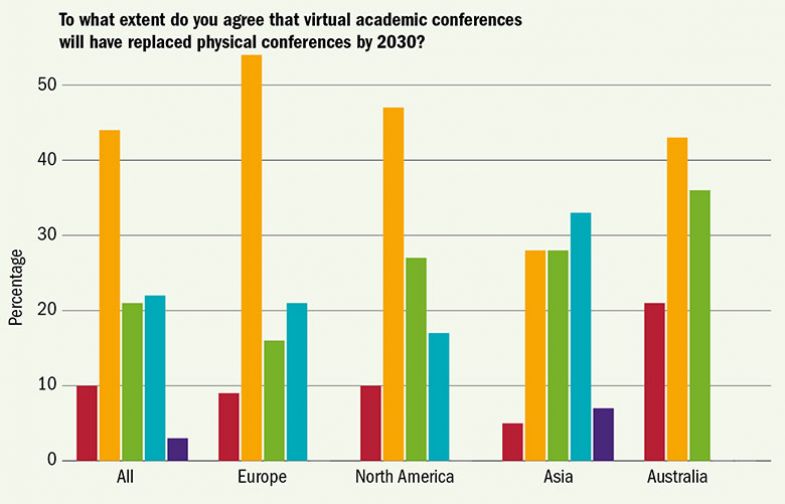
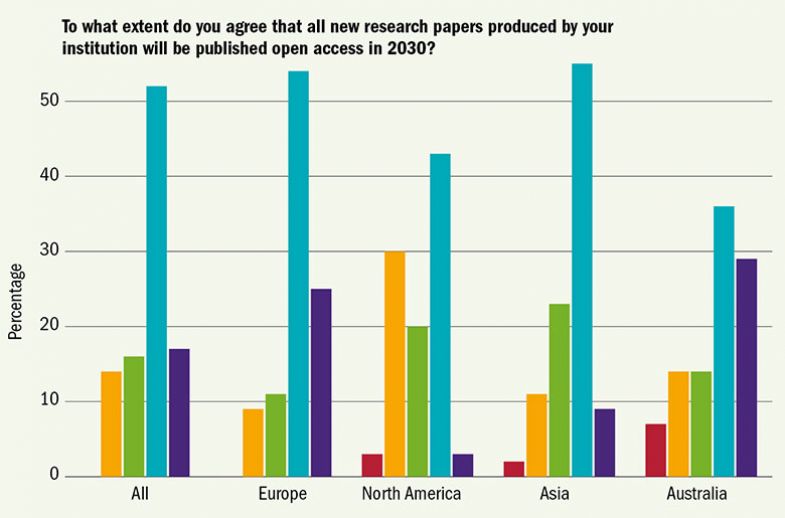
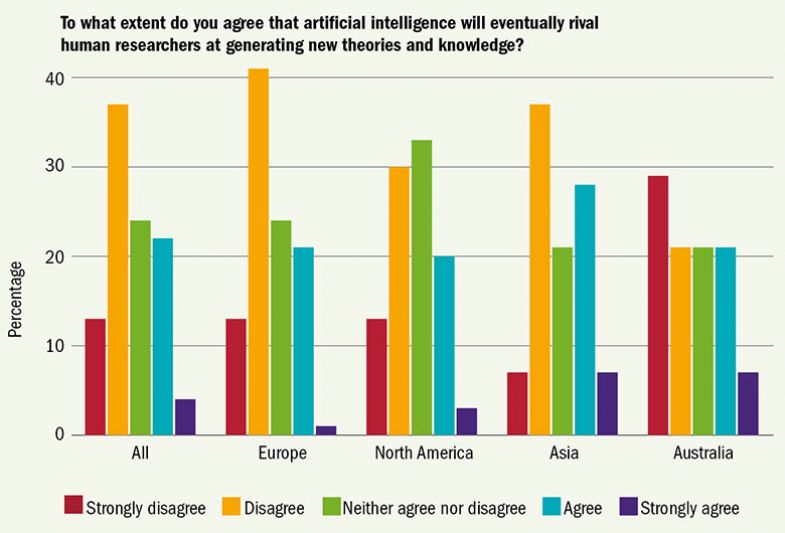
The broad picture the survey paints is of a university leadership reasonably sure that the physical campus will resist the digital tidal wave that has thrown the music, newspaper and retail industries, to name but three, into turmoil.
This confidence is perhaps understandable given the recent rise and fall of hype around massive open online courses. Five years ago, advocates were excitedly claiming that these would sweep away the bricks-and-mortar university. But the completion rate of Moocs remains “so low that this does not make a sustainable university”, says Fabio Massacci, rector’s delegate for national and international rankings at the University of Trento in Italy. And even Mooc providers themselves have scaled back their ambitions, with some now focusing on professional development courses.
University leaders take a similarly sceptical view about whether virtual conferences will supplant physical ones over the next dozen years.
Academic conferences have become huge business in recent decades, packing out hotels and venues around the world. Overall figures on this growth are hard to come by, but once-small conference organisers such as Gordon Research Conferences now host hundreds of events globally, with tens of thousands of participants. And it is not uncommon for senior academics to attend a dozen or more conferences a year, enduring semi-permanent jet lag, environmental guilt and the erosion of their precious research funding.
All this raises the question of why academia does not do away with the need for airlines and hotels by holding conferences online instead. After all, disquiet about the sums that universities spend on journal subscriptions was one of the early impetuses for shifting to an online, open-access model of publishing. And that movement has gathered such momentum that 69 per cent of our survey respondents expect all new research papers produced by their institutions to be published in an open-access format by 2030 – even if thoughts of thereby slashing publishers’ profit margins have long since withered as article processing charges have become ubiquitous.
Yet relatively few university leaders see academic conferences going online any time soon. Fifty-four per cent of respondents disagree or strongly disagree with the statement that “virtual academic conferences will have replaced physical conferences by 2030”, while only 25 per cent agree.
“The reason people go to conferences is to meet people and build relationships; the [formal presentations] are just the excuse,” explains Trento’s Massacci. A webinar, he says, lacks similar networking opportunities.
A US university president echoes this sentiment, likening the popularity of physical conferences to the popularity of bricks-and-mortar universities: “Human nature will continue to seek social interaction on a personal – as opposed to digital – basis.”
It is true that remote, cross-border research collaboration is increasing: by 2014, one in four scientific articles was the result of international collaboration, up from one in five a decade previously, according to Unesco. For PSL’s Fuchs, this means that face-to-face conferences – frequently “boring” in themselves – are vital opportunities for academics and researchers to catch up and confer with overseas collaborators. At one recent conference, for instance, Fuchs and his colleagues skipped the presentations and worked on a joint problem in a side room.
There is also great value, Fuchs says, in “having a beer at night” with fellow conference delegates, discussing funding, students and other professional preoccupations. “Science is a human process,” he notes.
In line with that sentiment, most respondents also agree that science will continue to require a human brain. Asked whether they think artificial intelligence will eventually rival human researchers at generating new theories and knowledge, 50 per cent of respondents disagree or strongly disagree, compared with 26 per cent who agree.
“For the foreseeable future (my lifetime) I can’t see AI reaching a level of development that includes the spirit of innovation that makes the difference between mundane analysis and breakthrough research,” notes one US university president.
Massacci is more dismissive still. For him, AI is “just the hype of the day. A similar hype has occurred in the past, and out of that we obtained [only] car [number] plate character recognition for automatic speed ticketing.”

Interestingly, the overall results hide a significant geographical split in attitudes towards technology. In Asia, university leaders are generally less conservative in their predictions for the future than those in other continents.
North American leaders are most likely to think that established and prestigious universities will be offering full degrees online by 2030, followed by respondents from Oceania (all of whom are at Australian institutions). And Australian leaders are much more likely than everyone else to believe that online degrees will be more popular than physical degrees by 2030: 57 per cent do so, compared with 26 per cent of Asian leaders, the next most likely group to take that view.
But Asian leaders are the most likely to believe that artificial intelligence will eventually rival human researchers, and to predict that virtual academic conferences will have replaced physical ones by 2030. In addition, a full 35 per cent of Asian leaders think that the physical lecture will have become extinct by 2030; in North America, the figure is just 3 per cent and in Europe 14 per cent.
PSL’s Fuchs thinks that these discrepancies could reflect a long-standing – and hotly debated – difference between Western and Eastern models of education. The Asian approach, he thinks, is “for the time being” perhaps more like Yeats’ bucket filling, rather than the lighting of fires through debate and discussion.
This “may change,” he adds. But for now, Asian universities appear to be bracing themselves for digital disruption more than Western ones are.
Register to continue
Why register?
- Registration is free and only takes a moment
- Once registered, you can read 3 articles a month
- Sign up for our newsletter
Subscribe
Or subscribe for unlimited access to:
- Unlimited access to news, views, insights & reviews
- Digital editions
- Digital access to THE’s university and college rankings analysis
Already registered or a current subscriber?







